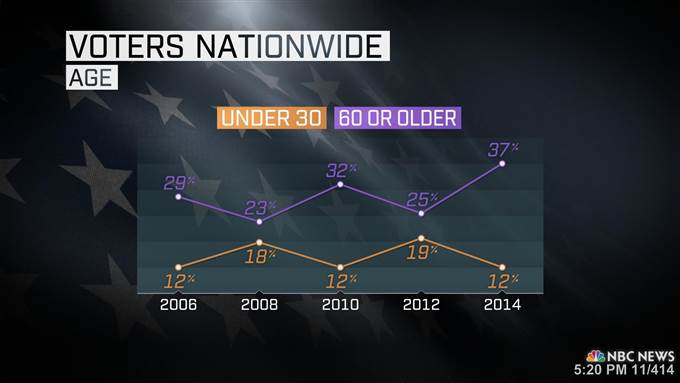While Brown didn't get swept up in the wave, virtually every other close race is being won by Republicans. Consider:
- Republicans are winning the vast majority of toss-ups in the races for governor and for Senate — including Cory Gardner in Colorado, Thom Tillis in North Carolina, David Perdue in Georgia and Pat Roberts in Kansas. In fact, New Hampshire is basically the one toss-up the GOPhasn't won.
- Former RNC chairman Ed Gillespie, who virtually nobody gave a chance to come anywhere close in the Virginia Senate race, is currently within half a point of Sen. Mark Warner (D-Va.).
- Republican Larry Hogan is currently leading the Maryland governor's race — a race he wasn't supposed to — by nine points with just more than half of precincts reporting.
- Another Democrat who was supposed to win easily, Vermont Gov. Peter Shumlin, currently leads by less than two points against a completely unheralded opponent whose name not even The Fix knew before tonight.
- Longtime Rep. Louise Slaughter (D-N.Y.), whose race was rated as safe by virtually all handicappers, is tied at 50 percent with 99 percent of precincts reporting.
- Another incumbent in a supposedly safe district in Maryland, freshman Rep. John Delaney (D-Md.), currently trails Republican Dan Bongino by two points with 57 percent of precincts reporting.
- Targets the GOP has long targeted, like Reps. Nick Rahall (D-W.Va.), Tim Bishop (D-N.Y.) and John Barrow (D-Ga.), have finally lost.
Final tally: GOP needed 6 seats to retake the Senate and got 8, plus likely two more when Alaska finally comes in and Louisiana's runoff is settled, for what will probably be a ten-seat pickup.
The reason?
Turnout failed miserably, according to the exit polls. Dems won women 53-46%, but lost men 55-42%.
The electorate for 2014 was a whopping 75% white, and Dems lost white voters by 20 points.
Two-thirds of voters in 2014 over 45, 75% were 40 or older. Millennials stayed home.
Black voters showed up, they made up 12% of the electorate, and went 89% for Dems. But Latino voters stayed home. They made up only 8% total of the electorate, and a third of them voted for the GOP.
Dems lost white women by 12 points. They lost white men by 30 points.
That's your ballgame.
Turnout nationally was lower than 2010.
The demographic mix of young, minority and women voters that twice helped elect Obama to the White House never was going to be as robust in a midterm election Yet the fall-off from the level of support the president enjoyed just two years ago was a major factor in the Democratic loss of the Senate.
Even when compared to the last midterm election in 2010, the American electorate Tuesday was older, exit polls show.
Those 65 and older represented a quarter of the national electorate, up from 21 percent four years earlier. Democrats sought to turn out younger voters, but that didn't happen nationally. The share of those 29 and younger was identical to 2010. The proportion of the electorate represented by Hispanics–8 percent–was identical to 2010. Turnout among black voters increased by a percentage point to 12 percent this year, and Asian voters increased by a single point as well, to 3 percent.
Republicans did even better than they did four years ago. We stayed home like chumps. That's your answer.




